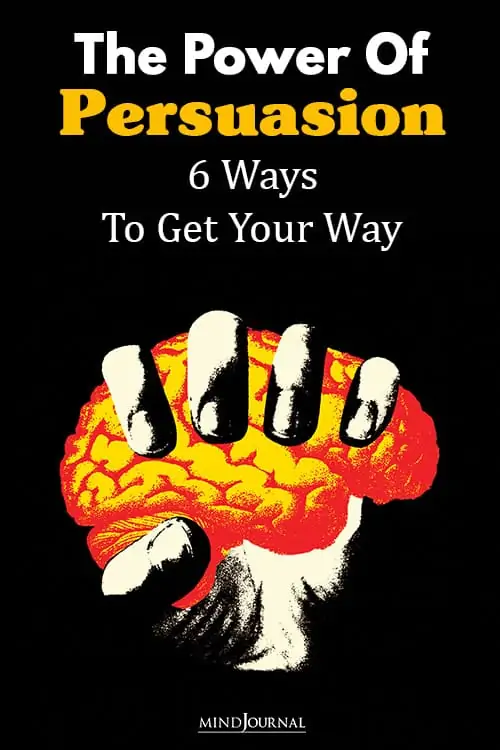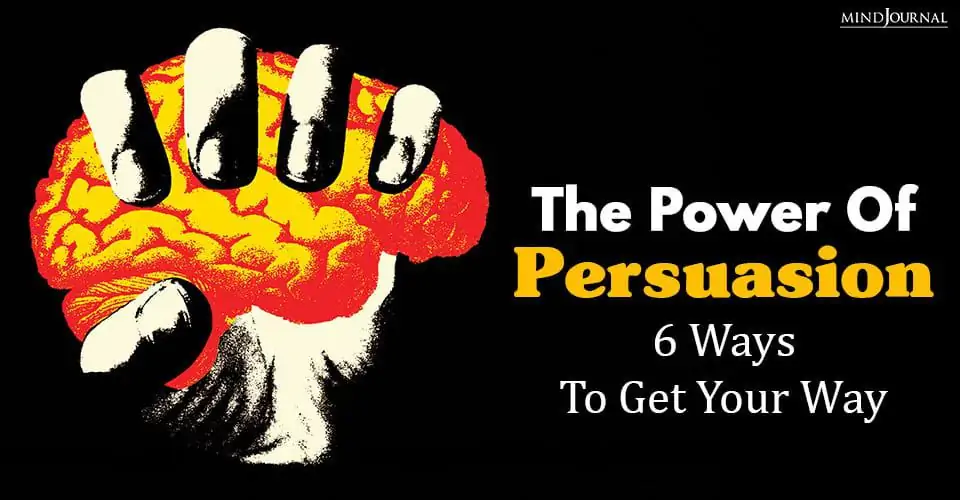Sometimes, when you want to get your way with people without them realizing what you are doing, you can use the power of persuasion.
Not too long ago, I taught a course at the University of Toronto titled the “Psychology of Persuasion.” I believed the course was worthwhile not to encourage manipulative behavior or unleash general psychological malice onto society—characteristics the word “persuade” tend to conjure up; rather, I felt that such a course would benefit people who strive to do well in the world and could use a leg up when it comes to knowing how to get their way—something people pleasers have an especially tough time with—and how to protect themselves from being swayed. These six research-backed principles, noted by Robert Cialdini, the “father of influence,” are worth taking note of:
Here Is How You Can Use The Power Of Persuasion To Get Your Own Way
1. Reciprocation
As a child, I noticed that whenever I was in a mall, salespeople would reach over to my mother and offer her a dollop of hand cream, a tiny vial of perfume, or a branded knickknack, to which she would, almost without fail, wave her hand in protest. When I asked her why she refused the kind gesture, she would say it was because she didn’t want to be indebted to the gift-giver to purchase anything.
Indeed, the principle of reciprocity is a strong one, because in our evolutionary history, cooperation is a skill of survival, and if someone gives, we feel the need to give back.
When trying to persuade through reciprocation, the key is to provide information that is helpful and positive, because, as Cialdini puts it, “there is a natural human tendency to dislike a person who brings us unpleasant information, even when that person did not cause the bad news. The simple association with it is enough to stimulate our dislike.” And, as detailed below, there is very little hope of exerting influence if we are disliked.
Related: 6 Mind Hacks To Persuade Anyone For Anything in Just 10 Seconds
2. Social Proof
Here’s an easy exercise you can try at home: Play your favorite show which featured a laugh track (Friends, How I Met Your Mother, and The Big Bang Theory are all good examples), and then watch it with the laugh track removed (some muted versions of popular shows are available on YouTube) or just on mute with closed captioning on.
Chances are, the scenarios in the shows won’t be as funny as you had first thought. According to research, audiences laugh longer and more often when a laugh track is running, and they rate the material as “funnier.” Why might this be? As Cialdini noted, it’s social proof.
In any given situation, we view a behavior as more correct to the degree that we see others enacting it. This is why in situations that are awkward or difficult, people tend to look across the room at others before behaving, in order to ensure their reaction is socially acceptable and/or “correct.” After all, no one wants to be the odd man out.
Social proof is important to us because we might make fewer mistakes, hypothetically, when we go along with the crowd. Although there are pitfalls to going with instead of against the grain (such as the bystander effect), people skilled at persuasion have exploited the idea of social proof by touting that “everyone’s doing it” or, especially in sales, that they have the “fastest-growing” or “largest-selling” product or service.
In other words, we tend to think that if everyone else is doing it, so should I. Whenever considering a purchase, or being swayed in a certain direction, ensure that you are doing so in alignment with what you yourself value, and not because you’re being told that your neighbors value it too.

3. Commitment and Consistency
Generally, once we say “yes” to something, we are much less likely to back out, because keeping our word is a noble quality, and allows us to function well as a society. The need to “save face” and be consistent is deeply ingrained in our culture, and we fear the social shame attached to being known as inconsistent. This is evidenced by the very language we use to describe someone who changes their mind often or won’t readily commit—”wishy-washy,” “flip-flopper,” or “wimp.”
We can use this principle to influence others by getting them to say yes to something small, preferably through a public declaration, then gradually making larger requests. (This is also known as the “foot-in-the-door” technique.) Another way to profit by the use of the commitment and consistency principle is to remind someone who is hesitant to side with you of decisions they’ve made in their past. By highlighting how your request is similar, you indicate that the decision they are currently facing should be consistent with one they’ve made in the past.
Similarly, be careful of these techniques being used on you, and feel free to quote the economist John Maynard Keynes: “When the facts change, I change my mind. What do you do, sir?”
Related: Why You Should Let Go The Control Freak Inside You
4. Liking
It should come as no surprise—particularly if you’ve ever been invited to an Avon sale, Tupperware party, or pyramid scheme offering—that we tend to say “yes” to people we know and like. Hearing our name said over and over—a common sales technique—helps us like the person we are speaking with, especially if they are physically attractive.
Receiving compliments and finding similarities between ourselves and others also helps us be persuaded when we otherwise might not be. While we can use these techniques for our own benefit—so long as they aren’t recognized as such by others—we can also make note of when others might be using them on us.
Want to know more about the power of persuasion? Check this video out below!
5. Authority
Simply put, people respect others who are credible experts in their field. We’re more likely to pay attention to medical advice from “Dr. Oz” than we would be from “Mr. Oz.” Similarly, we are more willing to purchase performance-enhancement products if they are promoted by people with superior physical skill, which is why product endorsements are so lucrative for athletes.
We trust our “dentist-recommended” toothpaste brands, not because we understand the chemistry of toothpaste enough to differentiate between brands, but simply because we believe a dentist has recommended it. Even a well-known spaghetti sauce brand has recently used an interesting display of authority in its television spots to attest the greatness of their sauce: Italian grandmothers.
All of these authoritative individuals, Italian grandmothers, and their sauce-tasting skill included are presumably far more knowledgeable about a specific topic than we are. It saves us time to put our trust in authority; it’s cognitively resourceful and also helps shift the blame if the products we purchase don’t turn out to be as wonderful as we’d been led to believe by the authority.
To employ influence yourself, cite or become a recognized expert about a certain subject and exert influence based on that expertise, whether on your office team or your soccer team. As for protecting yourself from being influenced by seeming authorities, carefully screen through their messages and recognize the advantages they may be receiving from trying to persuade you before you are swayed by a message given on authority alone.
6. Scarcity
“There are only a few pieces left …” “Don’t miss this rare opportunity …” “Here’s what you’ll miss out on if you don’t call within the next 15 minutes …”
If you’ve ever watched a shopping channel or late-night TV infomercials, you know the tactic of exploiting scarcity, and it’s a tried and true approach. According to Cialdini, ”The feeling of being in competition for scarce resources has powerfully motivating properties … [and] the joy is not in experiencing a scarce commodity but in possessing it.”
The principle here is creating the impression that we are losing something: “The idea of potential loss plays a large role in human decision making. In fact, people seem to be more motivated by the thought of losing something than by the thought of gaining something of equal value.”
Related: 10 Most Popular Psychological Persuasion Theories To Influence People
To exert influence using this technique, emphasize what someone will be missing by not buying your product or hearing you out. It has been demonstrated to be a stronger strategy than emphasizing the benefits alone. To protect yourself from this principle, sense if you’re feeling rushed into making a decision about something and take a step back to assess whether your newfound position is really in line with what you want.
Not all of these techniques will be effective at all times; they are context-dependent and require careful consideration and planning within your specific setting, but being armed with the knowledge of the principles needed to exert influence can not only help you become more influential but recognize when you are being influenced as well.
References:
Cialdini, R. B. (1987). Influence:The psychology of persuasion (Vol. 3). Port Harcourt: A. Michel.
Written By Mariana Bockarova Originally Appeared In Psychology Today









Leave a Reply
You must be logged in to post a comment.